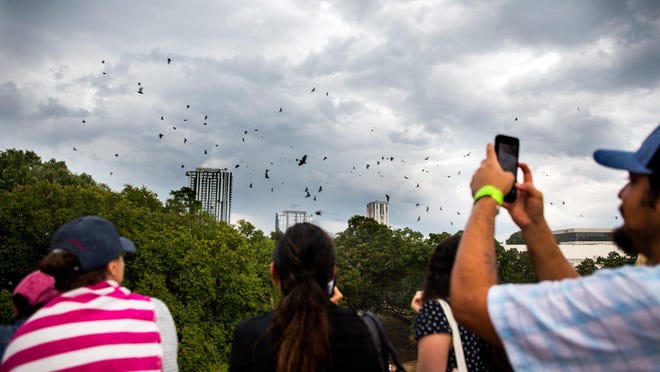How will Austin's bats react during Texas total solar eclipse? Here's what experts say.

Disaster declarations are declared, hotels are booked up, and Austinites are picking up pairs of glasses for April 8's total solar eclipse. But one cohort doesn't care about the eclipse at all. In fact, they'll probably sleep through the whole ordeal.
Bats in Central Texas will be asleep during the eclipse, which is when the moon passes in front of the sun causing complete darkness. The eclipse is expected to pass over Austin around 1:35 p.m. and last for roughly 2 minutes on the edge of town. Daytime is when bats are sleeping after a night of looking for food, said Fran Hutchins, director of Bracken Cave Reserve.
"Theres a really good chance that nothing's going to happen because they're going to be in a dark cave and not notice," Hutchins said.
More:Where are the best spots to view the total solar eclipse in Texas? Here are a few options
Austin's downtown bats are used to people and noise
Austin's colony of more than 1.5 million Mexican free-tailed bats who live under the Ann W. Richards Congress Avenue Bridge are used to noise, too, so hoards of eclipse viewers likely won't phase them, Hutchins said.
The bats at the bridge are used to vehicles driving over and runners, walkers, bikers and more using the trail around the bridge. They're accustomed to an urban landscape, Hutchins said.
And besides, "eating and getting a good night's sleep is probably higher on their to do list," he said.
More:It might shock you to learn when Austin’s last total solar eclipse was
Researchers will study eclipse behavior of bats at Bracken Cave
Bracken Cave, which is home to 15 million Mexican free-tailed bats, has a live stream available on its website to watch anytime. So, if you somehow don't have plans to watch the solar eclipse on April 8, you could watch to see if the bats emerge from the cave, which is in northern San Antonio.
Researchers will be at Bracken Cave on eclipse day to see what happens, Hutchins said. A group from Texas A&M will be watching to see how raptors, like red-tailed hawks, react to the eclipse, too.
Bracken Cave is also participating in NASA's Eclipse Soundscapes project. Researchers will record sounds at the cave two days before the eclipse and two days after to see if any behavioral differences in the animals in the area occur, Hutchins said.
Until then, Bracken Cave is in wait-and-see-mode, Hutchins said.
"(The bats) may not really even notice that it's getting dark outside," he said. "They're probably just going to sleep through the whole thing."